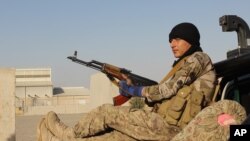Pakistan is hosting four-way talks Monday on reviving the Afghan peace process. The talks include Afghanistan, China and the United States.
Sartaj Aziz, who is Pakistani Prime Minister Nawaz Sharif's foreign policy adviser, addressed the opening session.
He said "The primary objective of the reconciliation process is to create conditions to bring the Taliban groups to the negotiating table and offer them incentives that can persuade them to move away from using violence as a tool for pursuing political goals."
The expansion of the Taliban insurgency in Afghanistan during the past year has fueled regional and international concerns the upcoming spring fighting season may lead to even more bloodshed and instability in the war-shattered country.
Aziz said the Islamabad meeting has been given the task of defining the overall direction of the Afghan reconciliation process, along with setting its goals and targets aimed at creating a conducive environment for holding direct talks between the Afghan government and Taliban groups.
Pakistan is believed to have influence over the Taliban, but relations with Afghanistan have been tense in recent months. The two countries have long accused each other of backing the Taliban and other insurgents operating along their porous border. Taliban leaders are widely believed to be based in Pakistani cities near the Afghan border, including Quetta and Peshawar.
There is widespread skepticism about whether the Taliban is ready to give up violence and reengage in "result-oriented" peace dialogue with the Afghan government.
Some regional analysts say Pakistan could be important in the Afghan peace process. “Pakistan has a vital role in these talks and it must play its role now as the Afghan government doesn’t have the capacity to bring the Afghan Taliban to the table for talks,” Pakistan-based defense analyst Saad M. Khan told VOA Deewa Radio.
Monday's talks do not include the Taliban, but Javid Faisal, a spokesman for Afghanistan Chief Executive Abdullah Abdullah, said the Pakistani government will provide a list of Taliban representatives who are willing to participate in the peace process.
The Reuters news agency reports some factions within the Afghan Taliban are considering taking part in the peace process.
Talks with the Taliban have been on hold since July, when they collapsed after just one meeting following Pakistan's announcement that longtime Taliban leader Mullah Mohammad Omar had been dead for more than two years. The Taliban called off its participation and a second meeting was canceled.
A subsequent power struggle within the Taliban has raised questions about who would represent the insurgents if the talks with Kabul are revived.
Analysts have cautioned that, despite the rapprochement between Kabul and Islamabad, any substantive peace talks are still months off. Taliban demands have consistently focused on an end to the international military presence in the country. The U.S. and NATO have 13,000 troops stationed in Afghanistan, mostly in a training capacity. They include 9,800 Americans.




